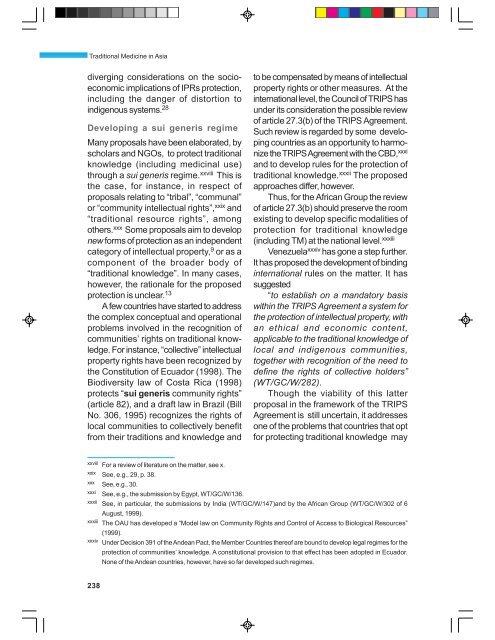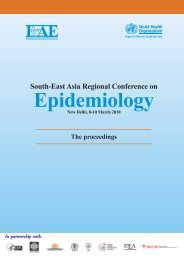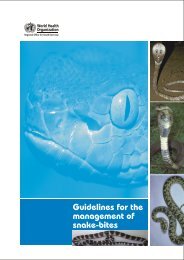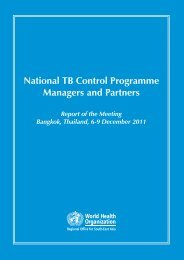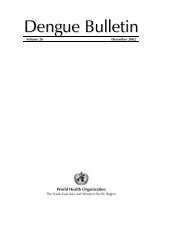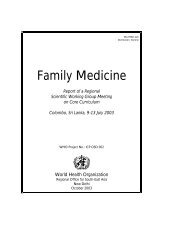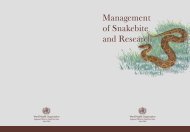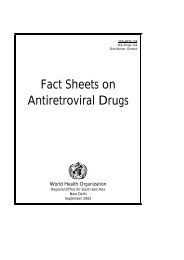Traditional Medicine in Asia
Traditional Medicine in Asia
Traditional Medicine in Asia
You also want an ePaper? Increase the reach of your titles
YUMPU automatically turns print PDFs into web optimized ePapers that Google loves.
<strong>Traditional</strong> <strong>Medic<strong>in</strong>e</strong> <strong>in</strong> <strong>Asia</strong><br />
diverg<strong>in</strong>g considerations on the socioeconomic<br />
implications of IPRs protection,<br />
<strong>in</strong>clud<strong>in</strong>g the danger of distortion to<br />
<strong>in</strong>digenous systems. 28<br />
Develop<strong>in</strong>g a sui generis regime<br />
Many proposals have been elaborated, by<br />
scholars and NGOs, to protect traditional<br />
knowledge (<strong>in</strong>clud<strong>in</strong>g medic<strong>in</strong>al use)<br />
through a sui generis regime. xxviii This is<br />
the case, for <strong>in</strong>stance, <strong>in</strong> respect of<br />
proposals relat<strong>in</strong>g to “tribal”, “communal”<br />
or “community <strong>in</strong>tellectual rights”, xxix and<br />
“traditional resource rights”, among<br />
others. xxx Some proposals aim to develop<br />
new forms of protection as an <strong>in</strong>dependent<br />
category of <strong>in</strong>tellectual property, 9 or as a<br />
component of the broader body of<br />
“traditional knowledge”. In many cases,<br />
however, the rationale for the proposed<br />
protection is unclear. 13<br />
A few countries have started to address<br />
the complex conceptual and operational<br />
problems <strong>in</strong>volved <strong>in</strong> the recognition of<br />
communities’ rights on traditional knowledge.<br />
For <strong>in</strong>stance, “collective” <strong>in</strong>tellectual<br />
property rights have been recognized by<br />
the Constitution of Ecuador (1998). The<br />
Biodiversity law of Costa Rica (1998)<br />
protects “sui generis community rights”<br />
(article 82), and a draft law <strong>in</strong> Brazil (Bill<br />
No. 306, 1995) recognizes the rights of<br />
local communities to collectively benefit<br />
from their traditions and knowledge and<br />
238<br />
to be compensated by means of <strong>in</strong>tellectual<br />
property rights or other measures. At the<br />
<strong>in</strong>ternational level, the Council of TRIPS has<br />
under its consideration the possible review<br />
of article 27.3(b) of the TRIPS Agreement.<br />
Such review is regarded by some develop<strong>in</strong>g<br />
countries as an opportunity to harmonize<br />
the TRIPS Agreement with the CBD, xxxi<br />
and to develop rules for the protection of<br />
traditional knowledge. xxxii The proposed<br />
approaches differ, however.<br />
Thus, for the African Group the review<br />
of article 27.3(b) should preserve the room<br />
exist<strong>in</strong>g to develop specific modalities of<br />
protection for traditional knowledge<br />
(<strong>in</strong>clud<strong>in</strong>g TM) at the national level. xxxiii<br />
Venezuela xxxiv has gone a step further.<br />
It has proposed the development of b<strong>in</strong>d<strong>in</strong>g<br />
<strong>in</strong>ternational rules on the matter. It has<br />
suggested<br />
“to establish on a mandatory basis<br />
with<strong>in</strong> the TRIPS Agreement a system for<br />
the protection of <strong>in</strong>tellectual property, with<br />
an ethical and economic content,<br />
applicable to the traditional knowledge of<br />
local and <strong>in</strong>digenous communities,<br />
together with recognition of the need to<br />
def<strong>in</strong>e the rights of collective holders”<br />
(WT/GC/W/282).<br />
Though the viability of this latter<br />
proposal <strong>in</strong> the framework of the TRIPS<br />
Agreement is still uncerta<strong>in</strong>, it addresses<br />
one of the problems that countries that opt<br />
for protect<strong>in</strong>g traditional knowledge may<br />
xxviii For a review of literature on the matter, see x.<br />
xxix See, e.g., 29, p. 38.<br />
xxx See, e.g., 30.<br />
xxxi See, e.g., the submission by Egypt, WT/GC/W/136.<br />
xxxii See, <strong>in</strong> particular, the submissions by India (WT/GC/W/147)and by the African Group (WT/GC/W/302 of 6<br />
August, 1999).<br />
xxxiii The OAU has developed a “Model law on Community Rights and Control of Access to Biological Resources”<br />
(1999).<br />
xxxiv Under Decision 391 of the Andean Pact, the Member Countries thereof are bound to develop legal regimes for the<br />
protection of communities’ knowledge. A constitutional provision to that effect has been adopted <strong>in</strong> Ecuador.<br />
None of the Andean countries, however, have so far developed such regimes.


